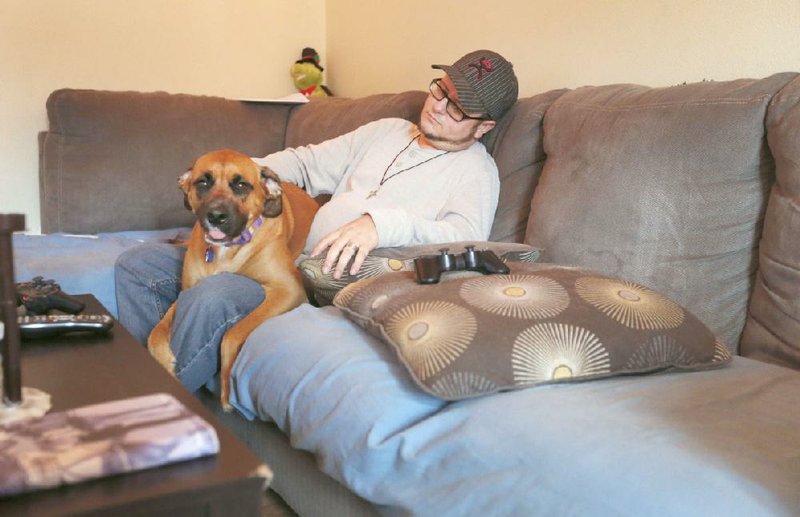SPRINGDALE -- For Justin Six, the nightmares started after Kosovo.
"We were doing a maneuver, and I was about to shoot an 8-year-old," said Six, a veteran living in Springdale with post-traumatic stress disorder. "That and working the mine fields."
Since his deployment, the 35-year-old has lived an isolated life. But lately he's been crawling out of the darkness with help from Maggie, an adopted puppy who is training to be his service dog.
"Me and her just get along. I'm very anti-social, and Maggie gets me out of the house. She gives me companionship when my wife is at work," he said.
When Justin's nightmares start, Maggie wakes him up by jostling his hands or waking up his wife. The dog is attuned to his emotions.
"If it wasn't for her, I don't think he'd still be here," said Six's wife, Brandi. "The depression was so bad, I was scared to leave him alone. Within a month of getting her, I started to see a change in him."
Maggie, who the Sixes said has been a blessing, began her life in Springfield, Mo.
In February, emergency medical technician Sarah Shoemaker and her partner parked their ambulance near a downtown bridge in Springfield while they waited for calls. It was there that Shoemaker spotted Maggie and her siblings.
She took them dog food, but a few nights later the temperature plummeted and Shoemaker was afraid the stray pups would die. She called her supervisor and asked for permission to transport the animals to her house.
The next day, she called Haven of the Ozarks, a no-kill shelter in Washburn, Mo., that can house 150 dogs and 60 cats a month, said treasurer Jennifer Silverberg. Every month, it has mobile adoptions in Fayetteville.
Maggie was adopted there in March.
It's rare for Justin Six to leave the house, because crowds make him anxious and he has a fear of people walking up behind him, but that afternoon he and his wife were headed to Barnes & Noble.
Petco was nearby, which is where Haven of the Ozarks had set up its mobile adoption.
"I said, 'Let's stop,' and his exact words were, 'We're not getting a dog,'" Brandi Six said.
But his connection with Maggie was instant.
"I took her for a walk, and that was it," Justin Six said.
Within a month, Brandi Six noticed her husband had less anxiety in public.
"I noticed he seemed a lot happier. It's almost like she's got his back," she said.
Soon after the couple adopted Maggie, they had her evaluated to see if she would make a good service dog. Among other things, service dogs can't startle easily, need to focus and must ignore other dogs.
Maggie passed.
She is training through Service Dogs of Distinction, an organization so new that it hasn't officially launched and is waiting for its nonprofit status approval. It serves Northwest Arkansas and Little Rock.
Marsha Wyatt, one of the organization's founders, is training Maggie. She has worked with animals for 25 years and said she continues to be amazed at the transformational powers animals have on humans.
"PTSD service dogs offer support for the veteran who often suffers social anxiety, depression, agoraphobia and is reclusive. The dogs offer unconditional love, are available 24/7, provide unwavering commitment and are their combat comrades. Soldiers are so connected to fellow soldiers and miss that bond and support terribly after war," Wyatt said.
Justin Six was diagnosed with PTSD in 2013. Wyatt said she has watched him come out of his shell and has seen some of his anxiety ease since she's been working with him and Maggie.
The U.S. Department of Veterans Affairs' National Center for PTSD does not recognize service dogs as a treatment for PTSD, saying there is not enough evidence to prove the animals help. But Six and Wyatt have no doubt, and both said they would love to see more veterans get service dogs.
"With the rate of veterans committing suicide, we need help. There is not enough recognition or help for these soldiers," Wyatt said.
After Maggie positively affected the Sixes' lives, Brandi Six sent a private Facebook message to staff members at Haven of the Ozarks to let them know what a difference the dog had made.
Silverberg read the message and asked Brandi Six to share her story in a national competition for shelters to earn a grant from Petco in exchange for stories from families who had adopted animals.
Out of more than 3,000 entries nationwide, the Sixes' story helped Haven of the Ozarks a $5,000 grant. The money is slated to be applied to the operating costs of the nonprofit shelter, which is funded completely by donations and fundraisers.
"That money was needed. Lately we've had more dogs with health problems and dental problems, and $5,000 doesn't even cover one month of vet bills," Silverberg said.
But her joy is about more than just the money.
It's not unusual to hear from a family who has had a successful adoption, Silverberg said, "but this is a great story. I am so happy for them."
Metro on 01/04/2016
